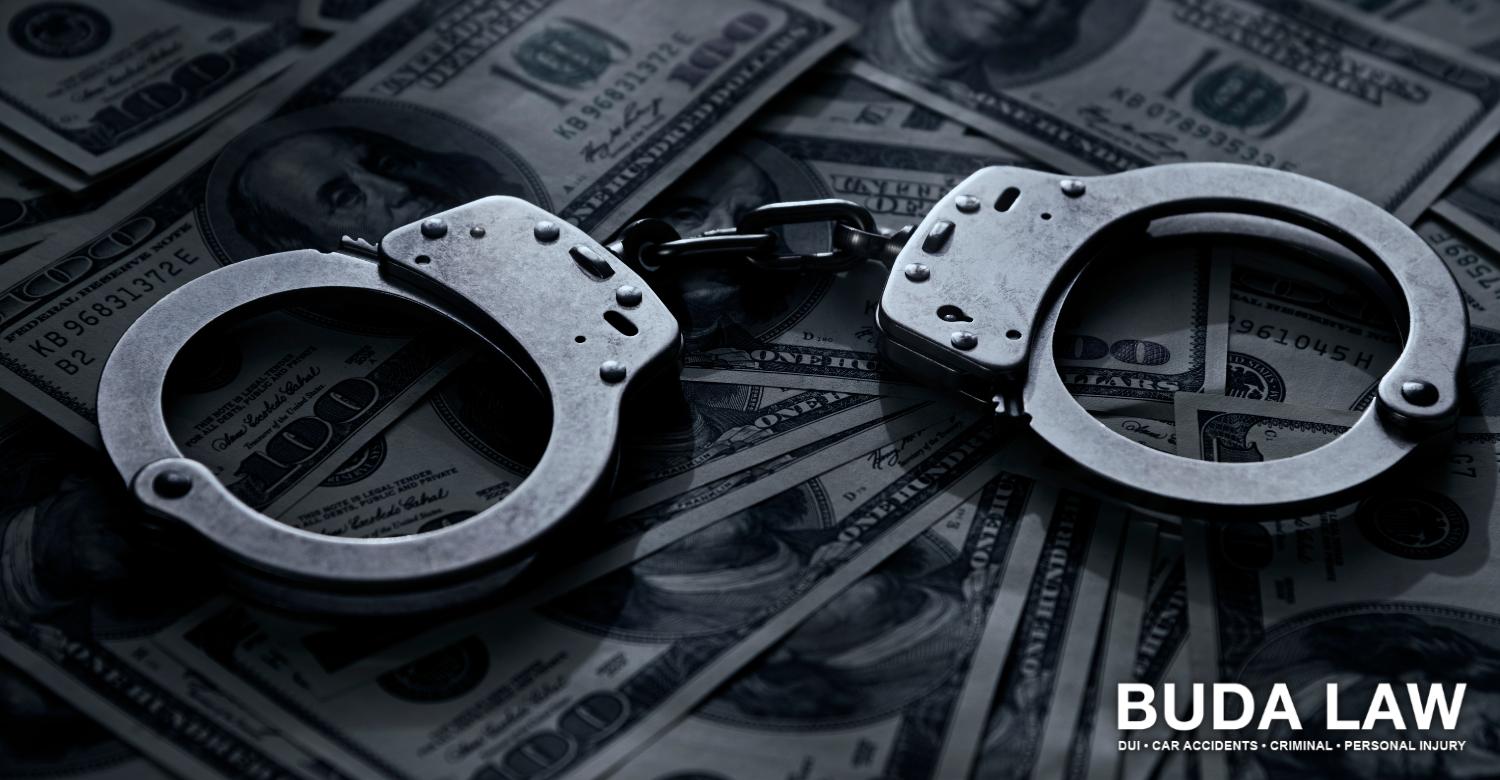In the face of criminal charges related to dealing in stolen property in Florida, the importance of securing skilled legal representation cannot be overstated. Understanding the legal implications of such charges is crucial for anyone navigating the complex legal landscape.
At Buda Law, our Tampa theft attorneys stand ready to offer comprehensive support and strategic defense to those facing these serious allegations. As the repercussions of such charges can be profound, starting the defense process quickly is critical.
In this blog, our Tampa criminal defense attorneys explain dealing in stolen property charges and the legal impact a conviction can have. To learn more or to speak with an attorney regarding your specific case, call Buda Law at (813) 332-2832 or reach out online today.

Definition of Dealing in Stolen Property in Florida
Stolen property means the criminally wrongful taking of tangible or intangible personal property without authorization. This includes physical items like electronics and intellectual property such as patents.
In Florida, the legal definition of dealing in stolen property is outlined in Florida Statute 812.019. According to this law, a person is guilty of dealing in stolen property if they traffic, or endeavor to traffic, in property they know or should know was obtained through theft. Trafficking, in this context, is broadly defined to include selling, distributing, or otherwise transferring stolen property or the buying, receiving, possessing, or obtaining control of such stolen property with the intent to sell, distribute, or transfer it.
The Florida statute further states that an individual’s knowledge about the stolen nature of the property can be inferred from the circumstances, making the act of dealing in stolen property a crime of intent. This implies that the accused must have had knowledge, or should have reasonably known, that the property was stolen for the act to be considered a criminal offense. The statute encompasses a wide range of actions, aiming to cover not only the direct handling of stolen goods but also any involvement in their distribution or sale.
Depending on the severity of the criminal charges of dealing in stolen property in Florida, a person could face either misdemeanor or felony penalties. If you’re charged with dealing in stolen property, you need experienced criminal defense attorney Andrew Buda by your side.
What Might This Look Like?
A common example of dealing in stolen property is when a person knowingly purchases goods at a significantly lower price than their fair market value from a source that is not reputable and then resells them for profit. This scenario often involves electronics or jewelry, where the seller’s eagerness to dispose of the recently stolen property at a low price should raise suspicions about its origin.
Dealing a stolen motor vehicle is another criminal act that falls under this offense. In this case, an individual may buy, sell, or transport a car or motorcycle for resale, parts, or even more serious criminal offenses.
Another example of stolen property dealing is when a pawn shop or antique store owner acquires vintage items without verifying ownership, later discovering they were part of a stolen collection. In some cases, individuals might use online marketplaces to sell items they know, or have reason to believe, were obtained through theft. It’s important to note that even if a person did not originally steal the item, their involvement in its sale or distribution can lead to charges of dealing in stolen property.
Misunderstandings can also occur when individuals unintentionally come into possession of stolen goods unwittingly. For example, receiving items as gifts or buying from flea markets without proper due diligence can inadvertently involve someone in a chain of illegal possession. These scenarios emphasize the importance of vigilance and due diligence in transactions, as common misconceptions or carelessness can lead to serious legal consequences under the umbrella of dealing in stolen property.

Elements Required for a Dealing in Stolen Property Charge
To convict someone for dealing in stolen property, the prosecutor must prove a few key things very clearly. First, they need to show that the person had control of the stolen item. This means more than just holding it; it could be storing it, selling it, or offering it for sale. Second, it’s important to prove that the person knew the item was stolen. This could be shown by how they got the item or its condition. Maybe they got something very valuable for a low price from a suspicious source, which might mean they knew it was stolen.
The prosecuting attorney must also prove that the person tried to sell, give away, or move the stolen item. For example, selling stolen items online or at a pawn shop. Finally, there must be proof that the person wanted to make money or get some benefit from doing this. These points must be proven beyond a reasonable doubt for a successful conviction in a stolen property case. If there isn’t strong evidence for each of these, the case might not be strong enough.
What are the Penalties for Dealing in Stolen Property?
The penalties for dealing in stolen property charges can be quite severe, reflecting the seriousness of the offense. It’s important to note that the penalties for stolen property offenses can vary based on the offender’s criminal history and other specific circumstances.
- For a second-degree misdemeanor, the punishment can include up to 60 days in jail and/or a fine not exceeding $500.
- Stolen property charges considered a third-degree felony can result in up to five years in prison and/or fines up to $5,000.
- A second-degree felony stolen property charge may result in a maximum sentence of 15 years and/or a fine of up to $10,000.
- A first-degree felony charge carries a potential sentence of up to 30 years in prison and/or a fine of up to $10,000.
A conviction for dealing in stolen property can lead to lasting consequences beyond prison sentences and fines. It results in a criminal record, which can severely limit employment opportunities, as many employers are wary of hiring individuals with a felony record. This can also halt career advancement and affect professional licensing. A criminal record can also affect housing options and access to educational loans and scholarships. For some, it may even restrict voting rights and the ability to own firearms.

How To Beat a Dealing in Stolen Property Charge
When you choose Andrew Buda to represent you against dealing in stolen property charges, you can trust that you’re getting the best criminal defense attorney in Tampa. Following your initial consultation, attorney Andrew Buda will create a defense strategy tailored to the circumstances of your criminal charges. Listed below are some strategies he has used to defend clients against dealing in stolen property offenses.
- Lack of Knowledge or Intent: Arguing the accused did not know stolen property, negating criminal intent.
- Lawful Ownership or Purchase: Providing evidence of legal ownership or legitimate purchase, refuting claims of illegal dealings.
- Procedural Errors or Misconduct: Challenging arrest or search procedures for potential violations of constitutional rights.
- Insufficient Evidence: Contesting the adequacy of evidence linking the accused to the alleged crime.
- Mistaken Identity: Asserting potential misidentification, casting doubt on witness and alleged victim statements.
- Coercion or Duress: Arguing the accused acted under duress or coercion, offering a valid defense in certain situations.
- Entrapment: Claiming inducement by law enforcement, suggesting charges should be dismissed.
- Ownership Dispute: Demonstrating a genuine property ownership dispute, suggesting a civil resolution rather than criminal prosecution.
- Illegal Search and Seizure: Challenging the legality of the search, citing Fourth Amendment rights violations.
As mentioned above, a dealing in stolen property conviction can result in more than just time in prison and fines. That’s why it’s crucial to take your charges seriously, even if it’s a misdemeanor offense.
How Tampa Criminal Defense Attorney Andrew Buda Can Help
Tampa stolen property attorney Andrew Buda plays a crucial role in navigating these types of criminal charges, offering invaluable assistance in dealing with legal complexities. With extensive experience as a former prosecuting attorney, he brings unparalleled knowledge to your defense, utilizing various tactics to address charges effectively.
From the initial consultation, attorney Andrew Buda assesses the case, working closely with clients to understand the uniqueness of their situation. Throughout the legal process, he provides thorough guidance, ensuring clients are well informed and prepared for each step.
Whether negotiating with Tampa prosecutors for reduced charges or defending clients in the courtroom, Tampa criminal defense attorney Andrew Buda’s commitment to protecting rights and building a solid defense is evident. His expertise not only lies in the courtroom but also in offering support during a challenging and stressful period, ultimately towards the best possible outcome for his clients.

Start Building Your Defense Today – Call Buda Law for a Free Consultation
Understanding the legal implications of dealing in stolen property in Florida is paramount, as it involves serious charges with potential long-term consequences. Buda Law, led by experienced criminal defense attorney Andrew Buda, specializes in navigating these complexities. With a free consultation, individuals can gain insights into their specific situation and discuss viable defense strategies.
Don’t face these charges alone; take the first step toward a strong defense by calling Buda Law at (813) 322-2832 for a free consultation today.
